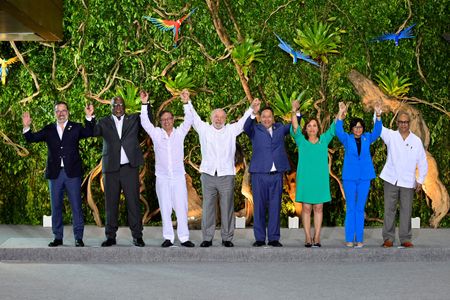 1
1 1
1
By Jake Spring
BELEM, Brazil (Reuters) -A dozen rainforest countries formed a pact on Wednesday at a summit in Brazil to demand developed countries pay to help poorer nations combat climate change and preserve biodiversity.
The joint statement, titled “United for Our Forests,” was issued by Bolivia, Brazil, Colombia, the Democratic Republic of Congo, Ecuador, Guyana, Indonesia, Peru, the Republic of Congo, Saint Vincent and the Grenadines, Suriname and Venezuela.
The Amazon, the Congo Basin and Southeast Asia are home to the world’s largest rainforests, critical ecosystems that absorb carbon dioxide and house a riotous diversity of species.
Brazil’s President Luiz Inacio Lula da Silva called this week’s Amazon Summit in a bid to forge a united front among rainforest nations when they engage in international negotiations like the United Nations’ COP28 climate summit, due to be held later this year.
“We are going to COP28 with the aim of telling the rich world that if they want to effectively preserve the forest that exists, they need to pay money not only to take care of the canopy, but to take care of the people who live under it,” Lula said on Wednesday.
In the joint statement, the dozen countries called for financing mechanisms to be developed for the world to pay for the critical services provided by forests.
They also expressed concerns that richer nations have not delivered on a promise to provide $100 billion in climate financing annually to developing countries. Additionally, they called on developed nations to meet an existing commitment to provide $200 billion per year for biodiversity preservation.
The countries also condemned the use of environmental measures that they said are disguised as trade restrictions, alluding to the European Union’s passage of a law prohibiting firms from importing goods linked to deforestation.
Wednesday’s pact builds on an accord a day earlier by the eight Amazon nations, which was criticized by some environmentalists for failing to secure a commitment to end deforestation by 2030.
Lula, a two-time former president who has long sought to build multilateral blocs with less developed nations, has repeatedly called on rich, industrialized countries to deliver on commitments to finance actions on climate change in poorer countries that did little to cause global warming.
At last year’s climate summit, Brazil, Democratic Republic of Congo and Indonesia agreed to form an alliance to pressure rich countries to pay for conservation. Republic of Congo’s inclusion in this week’s summit marks a gradual expansion of cooperation.
(Reporting by Jake Spring; Additional reporting by Steven Grattan; editing by Miral Fahmy and Deepa Babington)